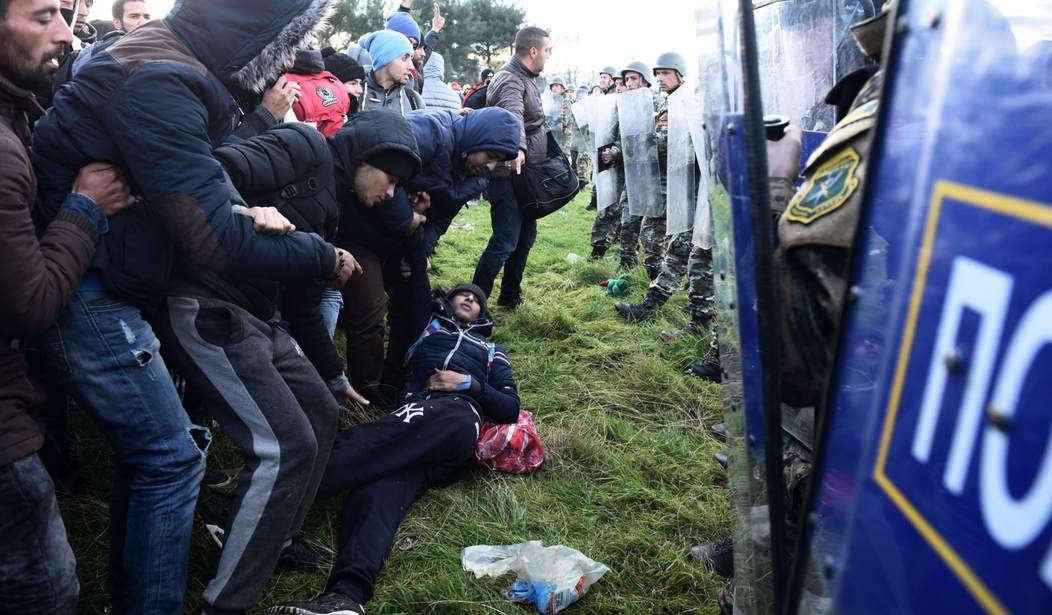Finland, a country sandwiched between Sweden and Russia, and which basically wants nothing more than to be left alone, is not happy to find itself suddenly on the front lines of Merkel’s Folly:
There is a sense of tension in the pretty, snow-covered Finnish town — an underlying fear which makes parents hold their children a little closer, and angry resentment towards the group of young men who arrived just a month ago. Kempele, almost 400 miles north of Helsinki, is usually a place where 17,000 unassuming townfolk while away the hours playing ice hockey. But that peaceful existence has been ripped apart by the rape of a 14-year-old girl as she walked home on a Monday night a fortnight ago.
The alleged culprit is one of the young men living at a migrant centre, which locals did not want in the first place.
But far from being an anomaly, Kempele – which saw hundreds take to the streets in an anti-immigration march last weekend — has become a snapshot of a country where people patrol the streets in vigilante mobs, block people crossing the border and even dress as the Ku Klux Klan at angry protests against the influx of refugees.
The situation is not so tense in some parts of the country. MailOnline went ten miles north of Kempele to Oulu where migrants at the Vallinkorva are living quietly and say they have been made to feel welcome in the town after fleeing the war-torn countries of Syria, Afghanistan and Iraq. And the country’s Prime Minister Juha Sipilä has offered newcomers a warm welcome – and even said they can use one of his homes in Kempele, where he was born, to use as emergency accommodation.
But…
In Kempele, the rape of the schoolgirl, just a fortnight after the centre for young migrants opened, sent shockwaves through the community. Rumours quickly spread around the town that two asylum seekers from Afghanistan had been arrested over the assault. It has since emerged that police have arrested a 17-year-old boy at the centre, who is in custody awaiting trial.
It was the spark needed for those who had opposed the centre in the first place to take to the streets – as hundreds turned out for a protest march demanding it be closed immediately. ‘Finland for the Finns! Close down the centre!’ they chanted.
They marched from the town square to the municipal house, and on towards the immigration centre, with many clutching Finnish flags. ‘We decided to sing the Finnish anthem in front of the immigration centre,’ one of the marchers, Janne Halunen, who is also local councillor for the right-wing True Finns party, told MailOnline.
But there was no one there to hear them, as all 30 asylum seekers inside the centre had been temporarily evacuated for their own safety to avoid any further confrontations and inflame the situation. They are back now – but the calls for the centre to be shut grow louder by the day.
And those calls will grow louder still. Meanwhile, in Austria, some “migrants” are discovering to their horror that the Viennese (the Viennese!) can be pretty unfriendly when they put their minds to it:
“Dogs are treated better than refugees in Austria,” say asylum seekers from war-torn countries, commenting on European hospitality. Citing a perceived lack of security, the fear of deportation, abuse, and homesickness, refugees who fled from Afghanistan, Iraq and Kosovo are reluctant to stay in Austria.
Some months have passed since Austrian citizens marched in a pro-refugee rally, welcoming asylum seekers fleeing conflict and poverty in their home countries. Now the same refugees complain of a lack of food and clothes, and that the expected shorter asylum process from Austrian authorities has not taken place as promised.
Data provided by the Austrian Interior Ministry show that since January over 1,100 Kosovans have returned home of their own volition as hopes that they would obtain refugee status in Austria were dashed. Unlike Kosovans, refugees from Afghanistan and Iraq have better chances to receive asylum. Some 530 Iraqi and 120 Afghani migrants have been documented as having left Austria. “This trend has become more noticeable since mid-September,” Interior Ministry spokesman Karl-Heinz Grundböck said.
According to the Caritas charity, 257 displaced persons from Iraq, 35 from Afghanistan and 53 Iranians returned to their countries of origin from September 1st through December 14 in 2015 compared to 2 Iraqis, 9 Afghans and 1 Iranian last year…
The refugees’ decision [to return home] has been financially supported by the EU and the Austrian Interior Ministry. The Iraqi and Afghan embassies in Austria’s capital confirmed that they have launched a return procedure to issue travel documents for migrants who failed to find asylum in Austria.
Expect to see more of this, too. The only question, going forward, is whether they leave willingly, or forcibly. Mutti Merkel has a lot to answer for.









Join the conversation as a VIP Member